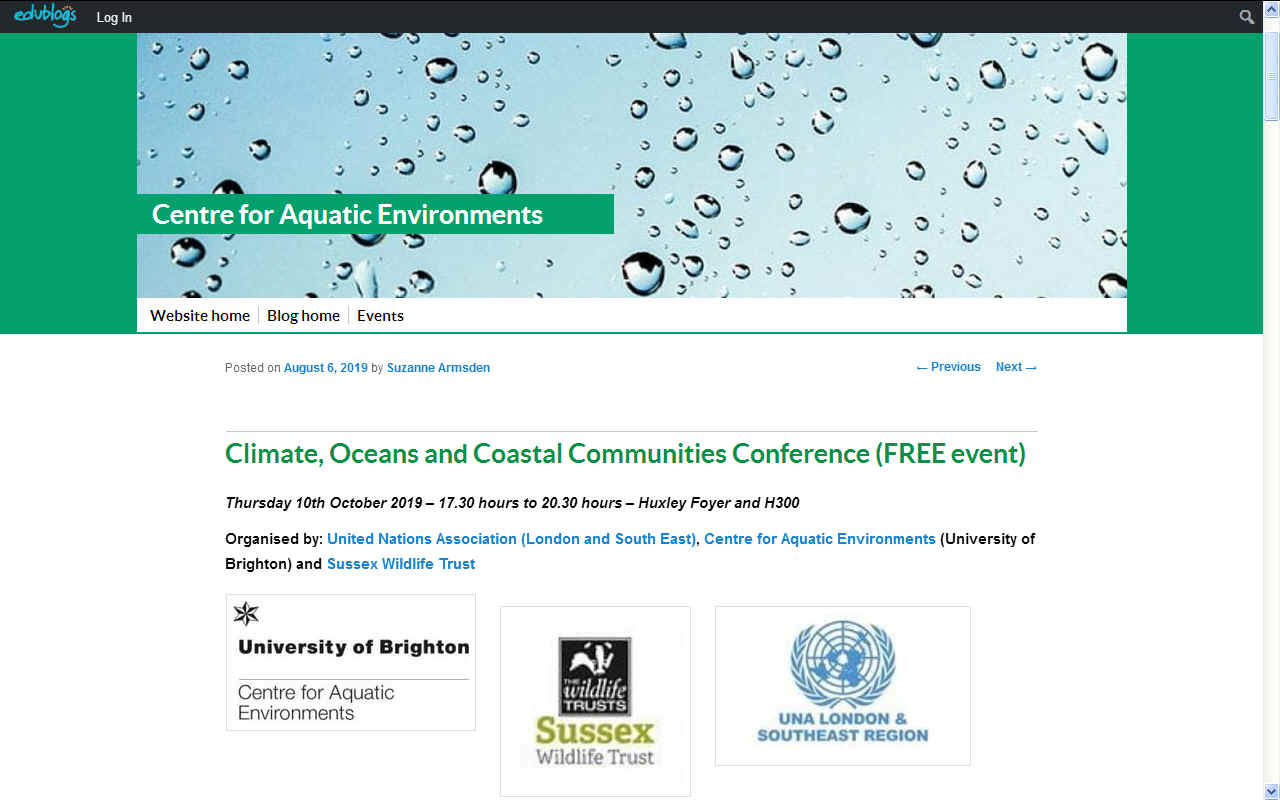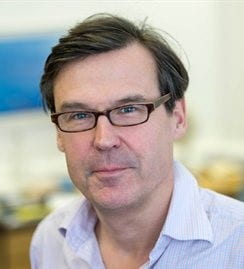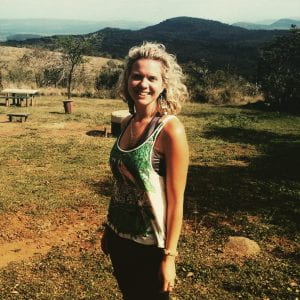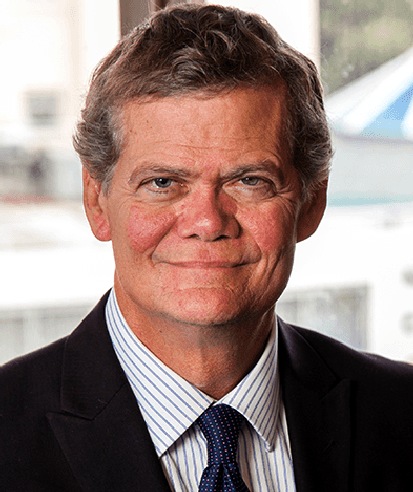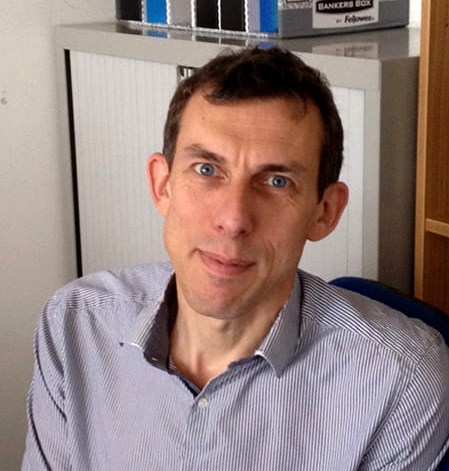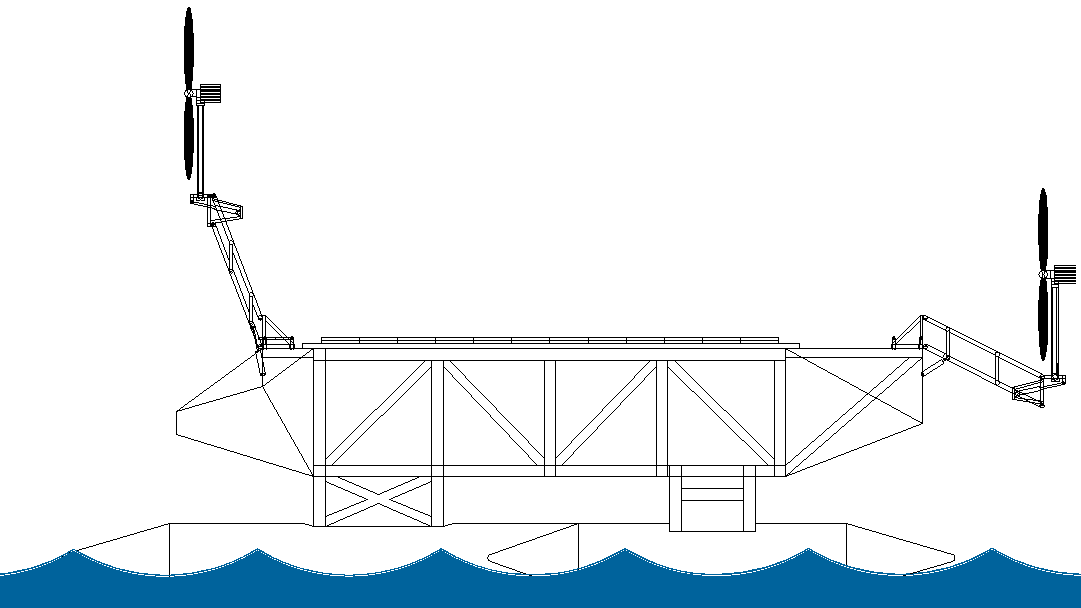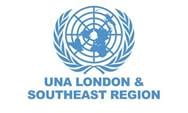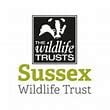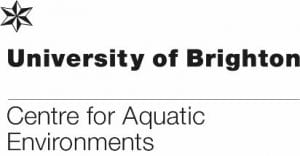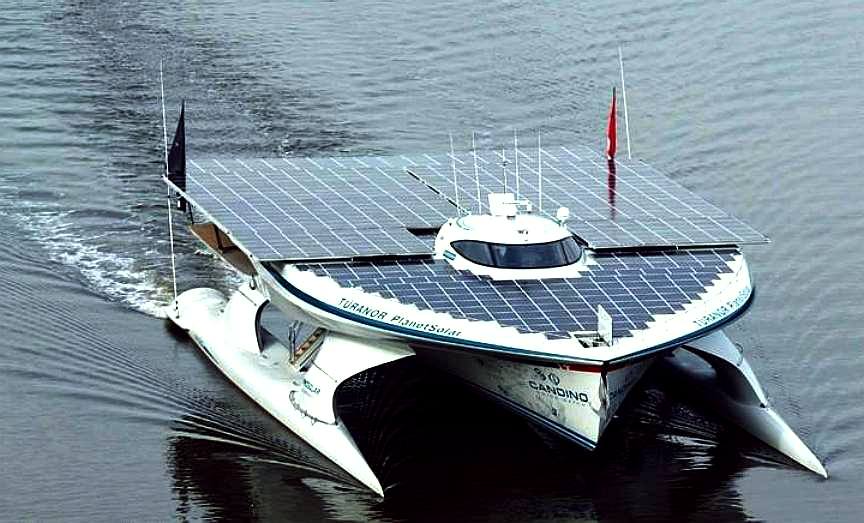|
BRIGHTON CLIMATE & COASTAL COMMUNITIES CONFERENCE
Please use our A-Z INDEX to navigate this site where page links may lead to other sites
|
|
CLIMATE CONFERENCE - Climate, Oceans and Coastal Communities Conference, Thursday 10th October 2019 – 17.30 hours to 20.30 hours – Organised by: United Nations Association (London and South East), Centre for Aquatic Environments (University of Brighton) and Sussex Wildlife Trust.
10 OCTOBER 2019, HUXLEY H300, BRIGHTON UNIVERSITY - FREE EVENT
This important Conference on Climate, Oceans and Coastal Communities aims to help understanding the environmental, economic and social consequences of global warming and climate change among coastal communities, at global and local level.
They had experts in the fields of the Environment, Social Sciences and Economics, providing analysis of case studies (Chichester harbour), sharing their perspectives and offering crucial potential solutions, encompassing a holistic approach to climate action. The Programme allowed for the audience to raise questions to the Panelists in order to engage with the different topics. This included the MP for Eastbourne, Rt Hon Stephen Lloyd, who shared his views on climate and local authority adaptation with the audience, an audience that included representatives from Eastbourne Borough Council. The Conference included a networking session, wine and the generous supply of nibbles.
The Paris Agreement, convened by the United Nations, marked a decisive global and historic event by calling for all governments to keep global temperature rise as close as possible to 1.5 C and therefore calling for a drastic reduction of greenhouse emissions. However, global warming and Climate Change keep having disastrous consequences around the World and more is needed, according to the Intergovernmental Panel on Climate Change (IPCC). In October 2018 the IPCC released a special report that highlighted the importance of limiting global warming to 1.5 C in order to prevent some of the worst-case scenarios. The report was clear that greenhouse gas emissions need to come down by 45 per cent by 2030 and reach zero emissions by 2050 to keep the crucial target.
The organizer's aim was to strengthen existing and new Climate Action Networks, enabling potential coordinated regional actions in our Coastal Communities.
PANELISTS - Dr Tim Coxon, Stephen Lloyd MP and Dr Adriana Ford, fielded questions from the audience on various environmental challenges, teaching and how climate change affects children's thinking which in turn has an effect on their parents. Ultimately, it is our children who will take up the fight for survival where we left off. On that score, the Swedish activist Greta Thunberg is not only a phenomenon but also a sign of things to come if change is slow in coming. "Be the solution, not the pollution."
PROGRAMME
17.30 Registration and networking – Huxley Foyer
ABOUT THE SPEAKERS:
Professor Andrew Church Associate Pro-Vice Chancellor (Research and Enterprise) University of Brighton
“How we damage nature and what we might do about it”
Dr Corina Ciocan Study of plastics and glass fibres in Chichester Harbour
A marine biologist, Corina’s expertise is in functional ecotoxicology, focusing on biological responses of marine organisms to environmental stressors. Prior to working at the University of Brighton, Corina was a full-time Research Fellow at the University of Sussex in the Aquatic Toxicology group. She was involved in a wide range of international research programmes, looking at detoxification mechanisms in marine invertebrates and their use as biomarkers, induction of DNA damage in critical growth regulating genes and impairment of sex determination/differentiation mechanisms in marine bivalves.
Dr Adriana Ford Centre Manager, Leverhulme Centre for Wildfires, Environment and Society, Imperial College London/King’s College London
Adriana is an interdisciplinary
environmental scientist and project manager who has worked on a variety of environmental issues, including
fisheries and coastal communities, wetlands, invasive species, ecosystem services, environment and health, and community-based environmental management. In 2019 she joined Imperial College and King’s College to manage their new
wildfires research centre. Prior to this, Adriana was coordinator of the Greenwich Maritime Centre at the University of Greenwich, and worked with Natural England and the
Marine Conservation Society on the Living Coast project. She maintains a strong interest in marine social sciences and is on the committee of the RGS Coastal and Marine Research Group.
Stephen Anthony Christopher Lloyd Liberal Democrat MP for Eastbourne
Stephen Lloyd is the MP for Eastbourne & Willingdon. He was born and brought up in Mombasa, Kenya. He was in business for over 25 years before entering politics. Elected as the Member of Parliament in 2010, narrowly losing his seat by 1.5% in 2015, and then re-elected in 2017, Stephen is known to be a very hard-working local MP who puts his constituency before party politics. Campaigns over the years have included helping secure £85m private money for the Arndale shopping centre regeneration, being the first MP to launch the 100 apprentices in 100 days initiative, playing a leading role in protecting services at the local hospital, persuading the Morrisons supermarket chain to recruit a significant percentage of its 350 new staff from people who had been long-term unemployed. Such a successful model the group have continued to do this ever since!
Stephen leads campaigns in parliament to bring down the age of bowel cancer screening, to implement a police Royal Commission and secure from the finance sector easier accessible interest-only mortgages for people in their 70’s. Like many issues these were first brought to his attention locally and he’s successfully taken them up to parliament to ensure a national outcome. His experience in parliament and focus on cross-party working ensures a level of success which has been recognised by the media. The Independent newspaper said of Stephen “a political system that can produce elected representatives like this may well be as good as it gets.”
Dr Tim Coxon Principal Lecturer, University of Brighton
Tim Coxon is a principal lecturer in the School of Education working with undergraduate trainee teachers and students studying the subject of education. A teacher and education advisor for 20 years in the UK and overseas, Tim joined the university in 2010 working in areas such as international education and global citizenship. Inspired by other teachers who had achieved accreditation from the United Nations
Climate Change Teacher Academy, Tim embarked on the training over the summer with the twin aims of developing his understanding of the impact of
climate change on children and young people and a wish to contribute to bringing climate change education to the classroom.
PANELISTS - Stephen Lloyd MP, Dr Adriana Ford and Professor Andrew Church on biodiversity and climate change. They were asked what we should do to fend off the fry up of planet earth, and while there is no simple solution, the one thing that came through was the planting of more trees. Something we advocate along with the building of affordable homes made of wood as a sustainable carbon lock. With most of our oxygen coming from marine flora, we were also interested to learn about seaweeds such as kelp, that are on the decline on Sussex coasts, the cause of which is unclear, but without doubt climate and acid oceans, mixed with pollution like plastics is not doing them a lot of good.
REPORT
2019 - The IPBES Global Assessment estimated that 1 million animal and plant species are threatened with extinction. It also documents how human actions have changed many aspects of nature and its contributions to people; but species threatened with extinction resonate with the media and the public in ways that degradation of habitats and alteration of rates of ecosystem processes perhaps don’t, so the figure was widely reported.
VENUE University of Brighton United
Kingdom
LINKS & REFERENCES
https://www.ipbes.net/news/million-threatened-species-thirteen-questions-answers https://www.linkedin.com/in/adrianaford/ https://centreforwildfires.org/ https://www.ipbes.net/ https://www.brighton.ac.uk/ https://www.rsaqua.co.uk/ https://www.brighton.ac.uk/aquatic/index.aspx https://sussexwildlifetrust.org.uk/ https://www.kcl.ac.uk/people/adriana-ford https://blogs.brighton.ac.uk/aquatic/2019/08/06/climate-oceans-and-coastal-communities-conference-free-event/
GUINNESS BOOK OF RECORDS - The first climate friendly blue water cruiser was the MS Turanor PlanetSolar (Switzerland) which circumnavigated the world in a westward direction from Monaco in 1 year 7 months and 7 days from 27 September 2010 to 4 May 2012. Why nobody has improved on the concept since then is a source of wonder. We aim to do so with around 20 collaborative research partners and a fair wind.
Please use our A-Z INDEX to navigate this site
|
|
|
This website is provided on a free basis as a public information service. copyright © Climate Change Trust 2019. Solar Studios, BN271RF, United Kingdom.
|
